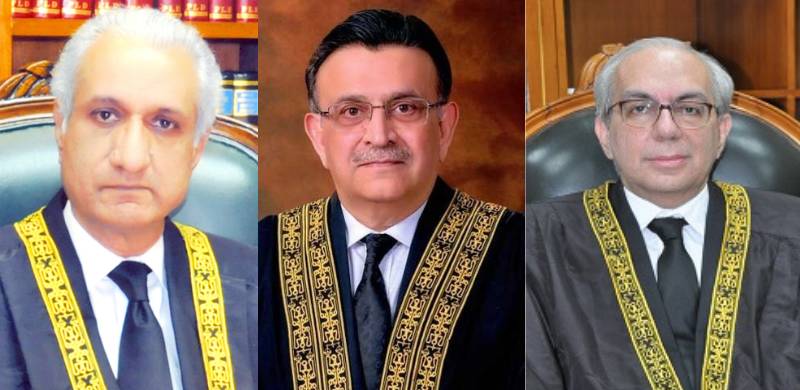
Several quarters have called for the formation of a full court bench to hear the petition filed by Pakistan Muslim League-Quaid's (PML-Q) Parvez Elahi against the ruling given by Punjab deputy speaker regarding the legality of the Punjab chief minister's election, with representatives of the parties heading the coalition government questioning the Supreme Court’s latest decisions. Here's why the demand for a full court is important.
The petition is currently set to be heard by Chief Justice Umar Ata Bandial, Justice Ijazul Ahsan and Justice Munib Akhter. It should be noted that these judges are also three of the five judges who deemed former National Assembly speaker Qasim Suri’s decision to dismiss the vote of no-confidence against PTI chief Imran Khan in April was unconstitutional, resulting in Khan’s ouster.
During the presser, Pakistan Muslim League-Nawaz (PML-N) Vice President Maryam Nawaz said that ‘bench-fixing’ is a serious crime, while Pakistan Peoples Party (PPP) Co-Chair Bilawal Bhutto-Zardari said that three people cannot be allowed to make decisions impacting the whole country, and stressed that the government alliance only sought a full court hearing.
The importance of a full court has also been highlighted by former members of the judiciary, including a former chief justice as well as three recently retired judges, one of which is Retired Judge Maqbool Baqar.
Retired judge Maqbool Baqar told Geo News that the ‘destructive process of re-writing’ the Constitution has begun, and that the Supreme Court does not comprise of the chief justice alone. He said that he was taken aback by what he termed a ‘clear violation’ of judicial tradition of bench formation.
Former senator and PPP leader Farhatullah Babar also stressed the importance of a full court hearing, and tweeted that if a judicial verdict regarding a constitutional interpretation is necessary, then it must be done by a full court.
https://twitter.com/FarhatullahB/status/1551481496170598400
The Human Rights Commission of Pakistan (HRCP) also said that it is crucial that the court appear nonpartisan and unbiased, which is why a full court was necessary.
https://twitter.com/HRCP87/status/1551481955081981953
The President of the Supreme Court Bar Association (SCBA) Ahsan Bhoon, as well as six former presidents of the SCBA have also supported the call for a full court bench, as have other analysts and experts.
https://twitter.com/hyzaidi/status/1551473025647869953
https://twitter.com/DaghaYounus/status/1551147607573012481
https://twitter.com/salmanAraja/status/1551474128938582016
https://twitter.com/NajamAli2020/status/1551441567721848832
https://twitter.com/reema_omer/status/1551244362419429378
https://twitter.com/LahoreMarquez/status/1551483937570127872
The petition is currently set to be heard by Chief Justice Umar Ata Bandial, Justice Ijazul Ahsan and Justice Munib Akhter. It should be noted that these judges are also three of the five judges who deemed former National Assembly speaker Qasim Suri’s decision to dismiss the vote of no-confidence against PTI chief Imran Khan in April was unconstitutional, resulting in Khan’s ouster.
During the presser, Pakistan Muslim League-Nawaz (PML-N) Vice President Maryam Nawaz said that ‘bench-fixing’ is a serious crime, while Pakistan Peoples Party (PPP) Co-Chair Bilawal Bhutto-Zardari said that three people cannot be allowed to make decisions impacting the whole country, and stressed that the government alliance only sought a full court hearing.
The importance of a full court has also been highlighted by former members of the judiciary, including a former chief justice as well as three recently retired judges, one of which is Retired Judge Maqbool Baqar.
Retired judge Maqbool Baqar told Geo News that the ‘destructive process of re-writing’ the Constitution has begun, and that the Supreme Court does not comprise of the chief justice alone. He said that he was taken aback by what he termed a ‘clear violation’ of judicial tradition of bench formation.
Former senator and PPP leader Farhatullah Babar also stressed the importance of a full court hearing, and tweeted that if a judicial verdict regarding a constitutional interpretation is necessary, then it must be done by a full court.
https://twitter.com/FarhatullahB/status/1551481496170598400
The Human Rights Commission of Pakistan (HRCP) also said that it is crucial that the court appear nonpartisan and unbiased, which is why a full court was necessary.
https://twitter.com/HRCP87/status/1551481955081981953
The President of the Supreme Court Bar Association (SCBA) Ahsan Bhoon, as well as six former presidents of the SCBA have also supported the call for a full court bench, as have other analysts and experts.
https://twitter.com/hyzaidi/status/1551473025647869953
https://twitter.com/DaghaYounus/status/1551147607573012481
https://twitter.com/salmanAraja/status/1551474128938582016
https://twitter.com/NajamAli2020/status/1551441567721848832
https://twitter.com/reema_omer/status/1551244362419429378
https://twitter.com/LahoreMarquez/status/1551483937570127872

